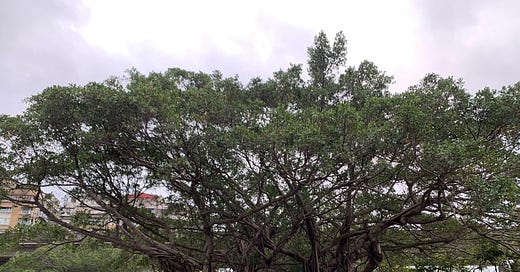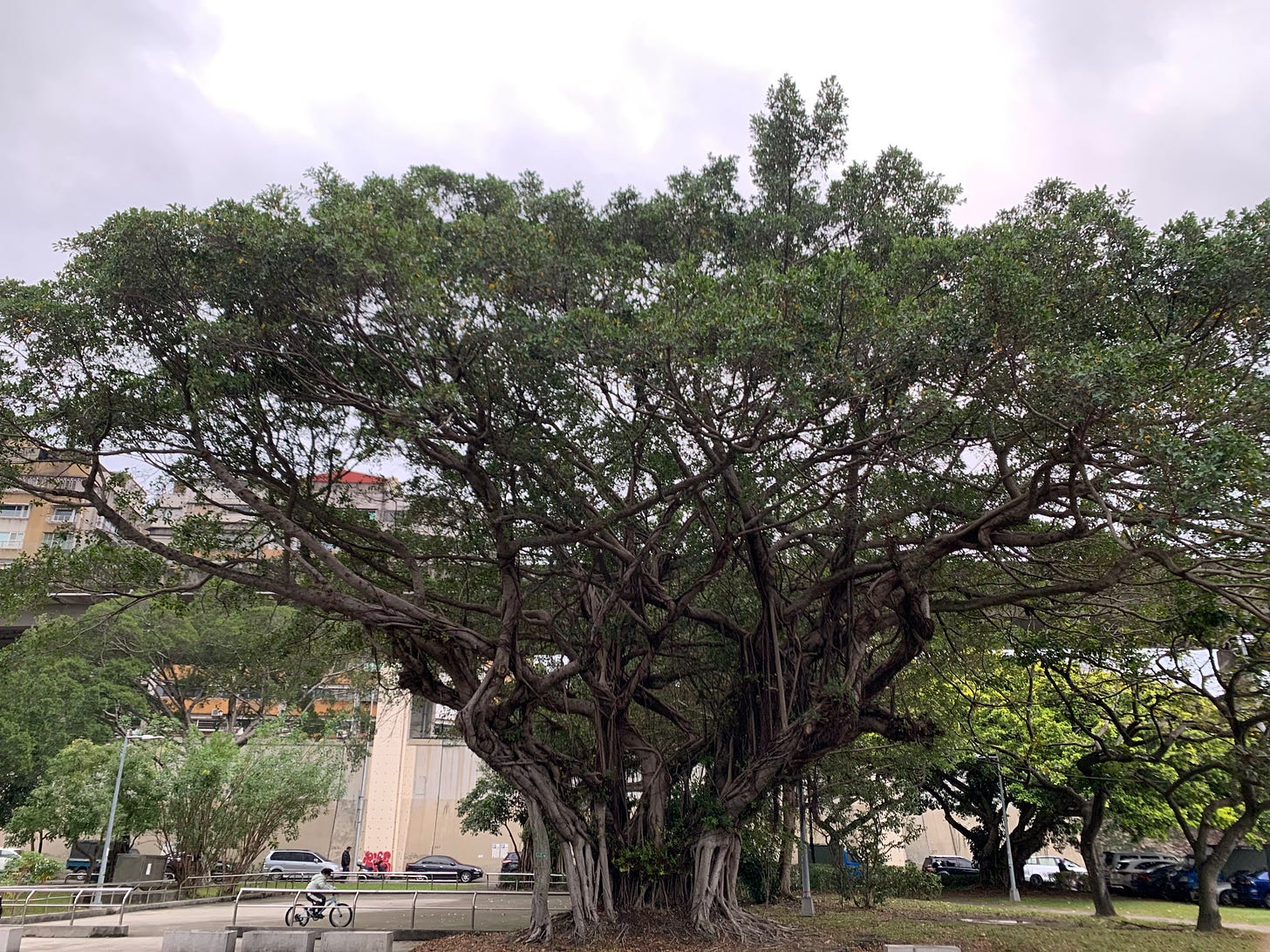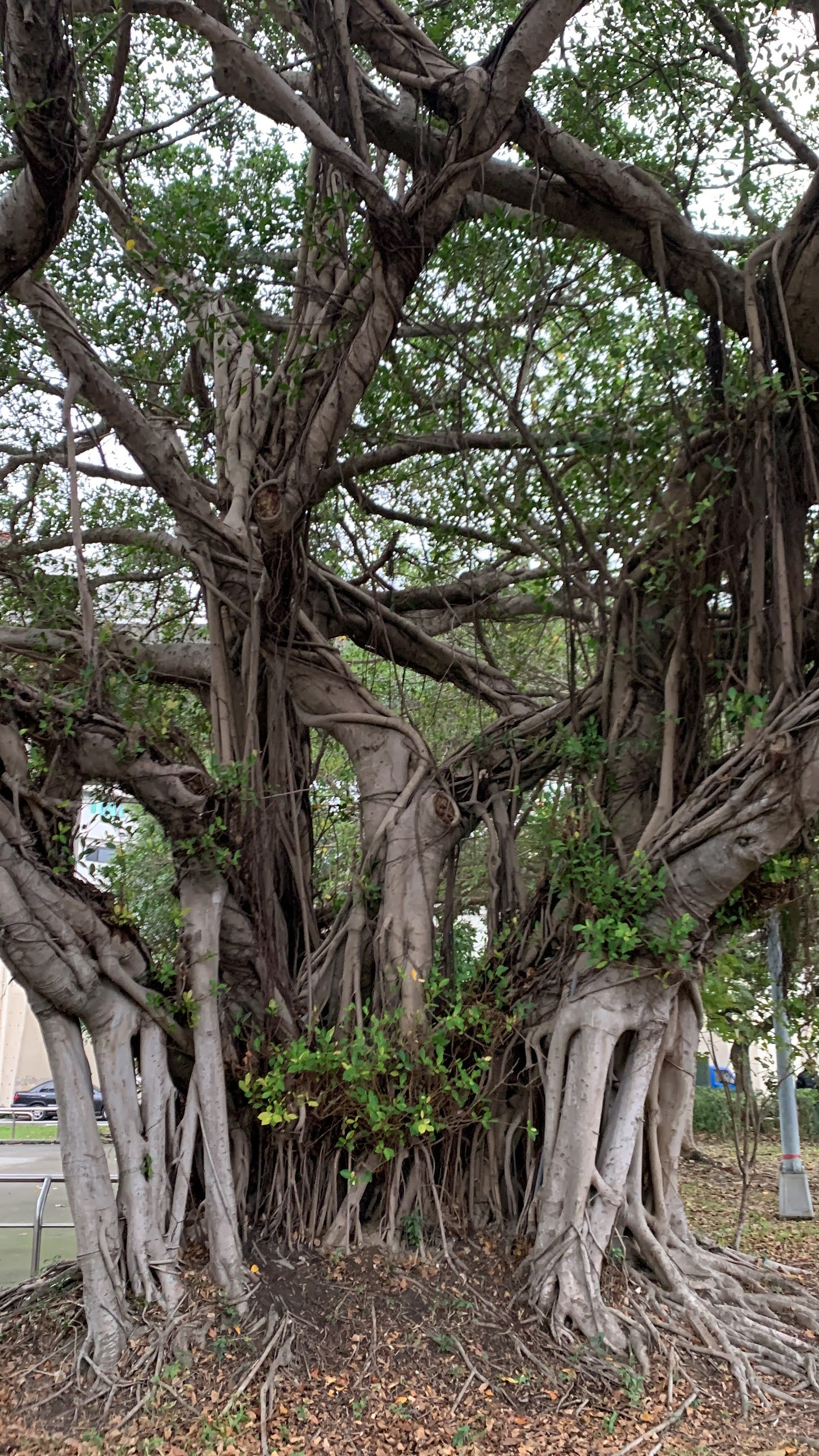I am a Banyan Tree ...
Embracing how I'll never actually untangle from the effects of Evangelicalism
The other day, I walked by a banyan tree and her story took my breath away. I paused for at least a good five minutes in front of her and studied her tangled roots and twisted branches, while also making sure to not stand under a bird who might be resting in her many branches.
As the light was quickly fading, the rest of my family urged me away to play a game of dodgeball with them. Before starting a game, I told them, “just look at this amazing 榕樹! Look at how so many roots and branches have joined together to grow into this one amazing tree!
Ever the smart one, my husband replied, “Yes, do you know how they join like that? The root or a branch strangles and kills another existing root to keep extending and growing.”
I stared back at him blankly thinking, “why do you have to keep it so real?” But then, the more I thought about this, the most intrigued I became. When the kids went to bed, I did a deep dive to study more about the Banyan Tree via Wikipedia and other websites about trees. The more I read, the more affinity I felt toward banyan trees, particularly, the Banyan Tree I had seen earlier in the day. While it would be more ideal to think that the roots learned to co-exist and the branches learned to share its nutrients and grow together, the reality of something having to die in order for the roots and the branches to grow more healthy and more strong feels more like real life - specifically, like what I’m understanding about my life right now.
For the longest time, I’ve tried to keep any semblance of harmony in hopes that everyone can get along. When I refer to “everyone”, I’m actually referring to people who call themselves “Christian”. Even though I have rarely agreed with everything I was taught in church and at the Christian institutions I’ve worked with, I’ve always walked to the tune of “focus on the big picture, focus on what really matters and don’t get entangled with debates about tongues or no tongues, dunking or sprinkling, who can partake in communion, so on and so forth.” But somewhere in the journey of trying to please everyone, I stunted my own growth. Though I knew my drive was for all to know God’s love and for all to see themselves as Creator God sees them, my road to get to a place where that sort of drive ACTUALLY existed inside a church was rarely found. Rather, I put down roots in many many different veins of evangelical churches.
I spent early formative years learning about God’s desire for everyone to hear about “Christianity” through the Christian school I attended. In middle school, I read countless books and watched impressionable videos about missionaries in remote places and about the Rapture1. So from an early and impressionable age of 12, I was sure that I would spend my life telling everyone I could about God because I did not want anyone to experience hell on earth. Essentially, what this means is that most of my spiritual energy went towards, what I now understand is, Evangelicalism.
Referring back to the Banyan Tree, I feel like my youth is like a tree trunk that is not made from one root but from many. Instead of growing tall, I grew wide. In 9th grade, I spent time learning about Bill Gothard’s Basic Life Principles. A few months after that, my weekends were spent attending prophetic conferences and being “healed” in the spirit.2 By my junior year in high school, I discovered Passion3 worship CDs and became involved with planning joint praise nights with other neighboring churches. The hope was to see revival, also known as every single person in the city “choose” to believe in Jesus and help to tell more people about Jesus. I remember one Sunday where the youth was invited to join the adults to protest a nearby Strip Club. Yes, even the adults were hoping for revival - which actually meant working hard to live a certain way to attain a possible dream of a good life. In the middle of my senior year, our church became interested in the prophetic teachings and practices again. There were many afternoons and evenings spent in prayer meetings where some would pray in tongues and someone else would interpret. Yes, there was so much time spent to “break” the things in the spiritual world to “open” the way for a smoother path to let more people know and experience and believe in God.
These are just some of the many roots of Evangelicalism that grew in high school. By the time I started college, I was burned out and stayed away from anything “Christian” that remotely felt like the busy Christian life I experienced in high school. So again, rather than growing tall, I just kept growing wide. I learned a lot about Complementarism from reading books by Wayne Grudem and John Piper.4 But by the end of college, something still felt missing in church evangelical culture. I still felt the pull to use my life for God, and with the encouragement of a few close friends, I applied and started seminary after college.
~*~*~
I take the time to write and momentarily relive parts of my past life as a devout Evangelical Christian because what’s become clear in this journey to “untangle” from Evangelicalism is that there is always more to untangle. In this lifetime, I’ve accepted I may never untangle myself from my Evangelical roots. Just when I think and feel I’ve grown and have moved on, something happens and I find myself having to pause to actively not go back to “autopilot” Evangelical mode. It’s absolutely maddening and exhausting. And so, back to the Banyan Tree.
I am like the Banyan Tree. I am a mystic whose spirituality was formed by what I witnessed my paternal grandma practice with her beliefs and then later formed by what I experienced from the “Christian”5 God through the Christian school I attended. Because I’ve always felt a strong connection to the spiritual, I’ve never quite settled with any one root or branch of “Christianity”. Every branch of Evangelical Christianity has always felt to lack the one thing that seemed most important in terms of what I had experienced with Creator God. Simply, I always felt it weird that I was taught to believe in a loving God but also taught that one can only be close to God if they have a certain lifestyle. It never made sense to prescribe a way to “be a Christian” when it seems all the descriptions of “Christians” in the Bible are all so unique and different. And so, I kept growing and learning and relearning and trying to survive in church spaces and aligning with the Evangelical “Christian” God until it nearly killed my own voice.
Thankfully, our family’s abrupt cut from overseas Evangelical church spaces did not kill my spirituality. Rather, it allowed the main root, who has been carrying me since I was first introduced to the concept of praying and pleasing the spiritual unknowns, to overpower and strangle the grip that Evangelicalism had in my life. I am learning to grow spiritually in a way that honors my unwavering belief in an unconditionally loving God who desires all to see themselves as made in the image of God. As I actively tell myself to just simply live, I also feel pain as I grow in this way of liberation and justice for all humankind. As I stretch away from Evangelicalism, more things from my past arise and I find the need to wrestle and have a moment to check in with myself to actively choose which of different possible scenarios honors my core beliefs? Every time I make this sort of decision, I find another part of my past dies so that I can keep stretching and growing to be the Banyan Tree I was created to be.
With the image of the Banyan Tree in mind, I daily give myself permission to keep growing and stretching into a more honest version of myself, pausing to wrestle with haunts from my past as they arise. I will never fully untangle, but my self-confidence is growing stronger and helping me to choose living in the now, rather than thinking self-denial and chosen suffering now will help bring others to Creator God. My focus is no longer on untangling, it is on living. And choosing to live every day can feel exhausting in and of itself. I am like a Banyan Tree, with broad tangled roots from my upbringing, culture, and learned religion. Embracing my past of tangled roots, I’m choosing to let parts of my past die so I can live and be a strong and healthy tree.
The Rapture is a teaching in some churches about how when Jesus returns a second time, all Christians will be gone from planet Earth and the rest of humanity will endure even more hardship but have another church to believe in God - although choosing to believe in God will definitely lead to martyrdom if you’re caught. A whole lucrative book series and movie was made from the idea of the Rapture - the Left Behind series.
My first experience of feeling the tingly sensation and then lying down to cry uncontrollably and then laugh uncontrollably remains one of most powerful moments in my life. I felt a lot of pressure in 9th grade, and that moment of just getting to lie down and cry and be prayed over and then just “laugh” was really a gift. And also, it began the journey to understand that because God is God, there are things I will not understand and learn to accept that. If God is truly mystical and miraculous, I’m going to have to expect miracles.
This is the name of a Christian conference for college and young adults. Passion Conferences started in 1995, and its mission has always been to encourage youth to choose to live so all may know God. Again, another branch of Evangelicalism.
I quote “Christian” because what I learned about God was greatly formed by what I was exposed to at the time - which in my childhood was Evangelical Christianity - then known as “non-denominational” church teachings.






